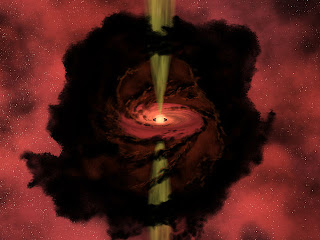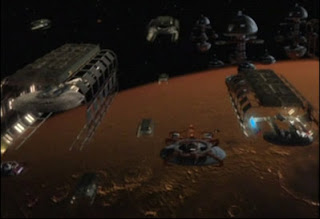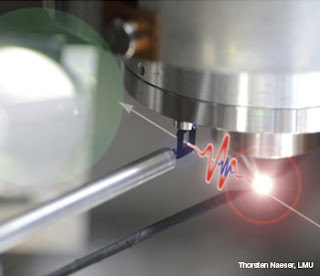The following is an excerpt from "Her Hand in Mine," a novella-length story I wrote in conjunction with my upcoming webcomic, "Wild Space Saga." Any critiques or requests to read the story are welcome.
The story is about a lonely scrap hauler named Jules who reunites with an alien friend from his childhood, and resumes their relationship, which has matured from the puppy love of their youth. Enjoy!
As it had done innumerable times that week, the incoming call hologram appeared on my phone as it lay upon the dresser across from my bed.
"Li-ah, why won't you turn that thing off?" Sar'vana murmured plaintively, her words coming in a background of soft, relaxed purring as I applied the detangling ointment to her fur and massaged it into her skin. It was a type of oil that Felyans used on themselves for personal grooming, but it was often customary for mates to apply it to each other. The process was very intimate, as I learned, like a full body massage when done correctly. And Sar'vana was a very good teacher. The scent, I learned, was the same familiar aroma that had constantly emanated from her and most other Felyans, something akin to baby powder.
"There might be an emergency," I replied as I finished applying the ointment to her tail, and reached for her brush.
"Well, so far, it's only been your friend, as usual," Sar'vana said, and hissed at the phone.
"He'll give up," I assured her.
"He hasn't yet."
I sighed as the hologram faded away. "You're right; he hasn't." It was the fourth day, I learned from viewing the timestamp on a previous attempt of Chester's that had occurred when we had last woken up. Time had otherwise blurred together in those endless hours, becoming meaningless as Sar'vana and I indulged ourselves in each other. "He's too damn persistent," I said with a deep, mildly annoyed sigh. "He knew that I'd be with you this week. He's got too much personality and not enough patience."
Sar'vana giggled at my remark, and then stiffened as my brush passed over the very sensitive base of her tail. She shuddered, and growled softly and deeply as I passed its fine bristles over her luxurious fur, being especially soft and gentle upon this part. Her reaction never failed to both amuse and arouse me, and my laugh was just as soft as her growl as I passed the brush several times upon the area.
"Oh, you're doing that on purpose, now," she said, trying to sound annoyed, but there was a betraying pleasured lilt in her voice that I could easily detect.
"Maybe," I said coyly.
Her tail slapped me upon my side as she hissed faintly. It was a playful, gentle slap, and I saw a faint smile upon her muzzle as she cast an alluring sideways glance at me.
"So are you really pissed, or are you just being frisky?" I asked, the scent of the ointment and the sight of Sar'vana's supine body building up the desire that my grooming of her had already thoroughly stoked.
"Well, now … that depends on whether or not you can finish the job without becoming 'frisky' yourself," Sar'vana said, and rolled over onto her back.
Laughing, I accepted her challenge, and forced down my desire as I went back to work.
"By the way, who is Keisha?"
That question was like a bucket of cold water on me, eliminating every vestige of my arousal, even as my hands neared her breasts. How could this have happened? I wondered, my mind racing with mixed fear and consternation. Hadn't I blocked Keisha's code from accessing my phone?
"Keisha…?" It was the only thing I could say. The name came out sounding incongruous and utterly stupid in my ears.
"I saw that your friend had left you a message last night," Sar'vana said. "You were still asleep. He said that Keisha was wondering where you were, and wondering why you never returned her calls."
I sighed with resignation. I'd expected this, of course; It wasn't as if I planned to keep this a secret. I knew that I'd have to tell Sar'vana about this before long, but I had hoped that it would have been on my terms.
I sat up in the bed, and curled my knees up to my chest. Sar'vana, noticing the doubtless troubled look on my face, turned over on her side, facing me.
"I don't know how you'll take this," I said. "You've probably already suspected that you're not the first woman I've been with, right?"
Sar'vana nodded without word.
I had intended to keep quiet about some of the things I knew, to soften the sting of my confession, but my lips overrode my intentions, as if an angel were forcing me to purge my conscience of all its sordid contents. I told Sar'vana everything. I told her about Keisha, the burn, our nights together, my confusion, and my regret. I couldn't bear to look directly at her as I spoke, yet I could feel Sar'vana's beautiful, violet eyes fixed upon me as I talked on, like a balloon inflated with sin releasing its contents through a tiny hole.
"I'm not a virgin, Vani," I said in conclusion, "but I had little interest in women until I met you. And then … well … you know the rest." Drained and without excuse, my eyes tightened as I, guilty by my own word, waited for the storm of reproach that I was certain would come.
"Whom do you love?" Sar'vana asked.
Her question, spoken gently, and devoid of any judgment, caught me utterly and completely off-guard. I blinked the tears from my eyes as I once again settled my gaze upon Sar'vana. Like an angel, there was no look of anger in her lovely eyes, no condemnation.
"Who … whom do I…?" I sputtered.
"Whom do you love?" Sar'vana asked again, her voice without any betrayal of judgment.
"Well … you, of course," I said, still amazed that this conversation had even taken such an unforeseen turn. "I've always loved you."
"Are you certain of this?" Sar'vana asked.
"I've never been more certain in my life.
"And are you my li-ah as I am yours?"
I crawled to her, and took her hand in my own.
"Vani … If I had my pick of any woman on this planet, but was denied you, I'd choose celibacy," I said with earnestness that burned from the depths of my heart. "I would be sterilized before I'd choose any other girl. Were it allowed, and were it possible, I would have you bear our children. Li-ah … I've loved you since we were kids. And my only regret is not having had the courage to act on my feelings sooner."
"Then there is nothing to forgive," she whispered.
And just like that, it was over. And as we kissed, all the shame and confusion of the times of the burn vanished at her gentle touch. We fell into the soft sheets, reveling in that joy that I felt at her forgiveness, and sought to bring that joy … and that love … once again, into its fullest expression.









